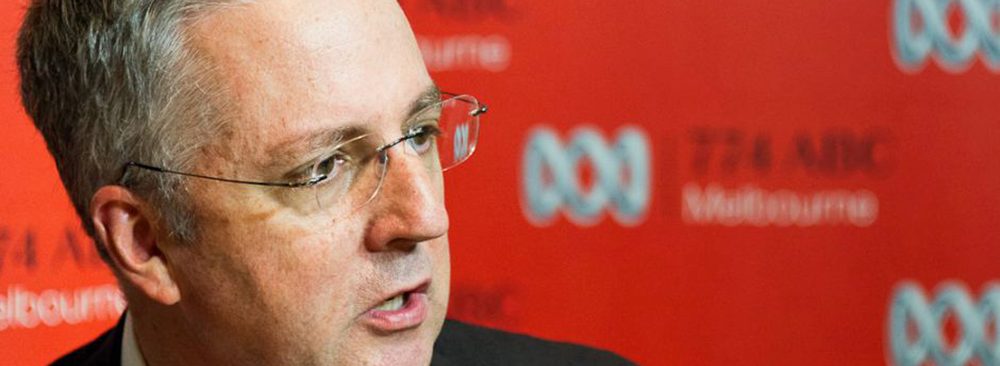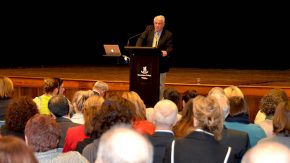ABC’s Mark Scott talks about What’s in the Public Interest
Managing Director of the Australian Broadcasting Corporation, Mr Mark Scott AO, is a man who works in big pictures and right now he sees the landscape for mass media facing vast transformational change in what is its relatively short history.
At Newington’s second Centre for Ethics lecture for 2014, Mr Scott briefly took us back to the days of four/five television stations and two major newspapers. These media players were the arbitrators of news and current affairs in Australia. Back then there was more control over content and the selling of advertisements as a few media outlets had exclusive rights as gatekeepers to the dissemination of information.
Move forward 25 years and suddenly we all have access to a world of news seamlessly and instantaneously. Mr Scott referenced the famous quote from scientist and researcher Roy Amara, ‘We tend to overestimate the effect of a technology in the short run and underestimate the effect in the long run’ to open this lecture.
“We are in the early days and we cannot envisage what it might be in the future”, he added.
Previous to his appointment at the ABC, Mr Scott was the Editorial Director for a number of Fairfax Newspaper mastheads. He notes that one of the biggest changes since his Fairfax days is the “abundance of content” that is now available. He says, there are now hundreds of millions of outlets to create and share media content.
“It is not from broadcast towers but out of garages that creators, with no background in media, create and consume”, he said.
“We are seeing the demise of the town square, fewer people gathering in the one place. Few people experience news content in the way anyone else does.”
Because of this, Mr Scott argues that our relationship with news has changed, as we seek out information which interests us.
“In choosing your media world, you can choose to only hear your views being reinforced rather than challenged. You can narrowly choose the views and perspectives that comfort you, and in your ‘echo chamber’, you are convinced of the correctness of your view of the world. It is a disproportionate view, that your view is right and in the majority. This over emphasises the popularity of your view and increases your intolerance of those who do not share your view.”
Mr Scott feels this has led to an increased level of combativeness among people; an intolerance for differences in opinion, and a challenge to our ability and need to understand others’ perspectives.
Having said this, Mr Scott was not flouting the reputation of the many large media moguls who profit on scandal. In particular, he referred to the British tabloid’s mobile phone-hacking coverage and their justification that they were simply ‘giving people what they wanted – celebrities and scandals’. Instead he makes a distinction between what it means for something to be of interest to the public versus the public’s interest.
“Public interest and public curiosity (what they are interested in) are not the same thing!”, said Mr Scott.
In bringing the lecture back to the ABC, Mr Scott said our national broadcaster is governed by what is best for civic life. The ABC does not have to win ratings or attract advertising and for these reasons has a greater responsibility to ethical considerations and it’s role in representing Australian Life and Australian stories. “The ABC has to live up to being seen as an enduing legacy but also relevant, with a special relationship with the Australian people.”
In response to recent debate about ABC bias, Mr Scott said that ABC content is heavily scrutinized with senate estimates hearings, and the journalistic expectation of performance and standards are very high. The ABC, he said, has a duty to convey a standpoint that can withstand the weight of evidence and integrity when considering what opinions and stories have air time.
“The ABC was initiated as an independent public broadcaster. Being funded by government and yet independent of government is key to the operation of the ABC”, he explained.
With this, Mr Scott reminded us that the ABC has unsettled governments in the past. “The most important stories have been stories that would deeply upset government. [For example] Chris Master’s Four Corners series on the Queensland Government, ‘The Moonlight State’, led to the Fitzgerald Inquiry”.
For the ‘would be’ foreign correspondents and journalists in the audience, the truth about job cuts within the media industry was sobering. Thousands apply for the very few roles available at the ABC, and there is no guarantee you will get in. “Public listing of media has led to a need to maximise profit for shareholders. Commercial news networks find it hard to invest in news and current affairs”, Mr Scott said. The good news is that there are more roles within ‘Aunty’ than in the commercial networks who have had to cut newsrooms and production teams.
As a journo for 30 years he was encouraging students to keep writing and get published. “There is no more interesting place than the news room – the biggest stories are the ones you didn’t know were coming – the hardest days are when there is no news.”
And to reinstate the credibility of ethics in journalism he affirmed: “A media that functions well, does an enormous public good. It takes us to places that are new and interesting so we can be exposed to contradiction; to ideas that shake things up.”






